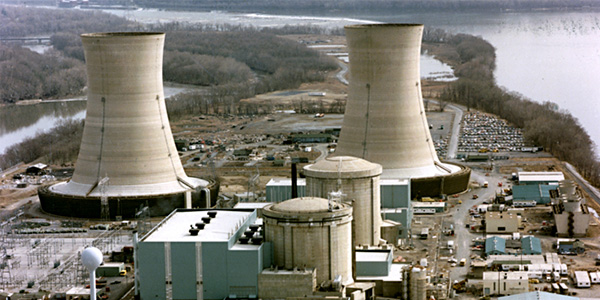By Christen Smith
Pennsylvania lawmakers proposed another $500 million plan to subsidize the state’s nuclear industry and characterized as politically motivated ongoing criticisms that the effort represents a corporate bailout.
State Sen. Ryan Aument (R) introduced Senate Bill 510 on Wednesday, more than three weeks after a similar House of Representatives bill, HB 11, drew reproach for its perceived prioritizing of aging, expensive nuclear reactors over cleaner, cheaper forms of energy. (See Lawmakers Unveil $500M Nuke Subsidy Bill.) Nuclear generation supplied about 42% of Pennsylvania’s net generation in 2017, compared with 4.5% for renewables, according to the Energy Information Administration.
“Powerful special interests have disingenuously branded any support for the nuclear industry as a ‘bailout,’ but in reality, current law stacks the deck heavily against Pennsylvania’s nuclear plants,” Aument said. “Including nuclear energy in the state’s alternative energy plans will help level the playing field for the industry and ensure its long-term viability in Pennsylvania’s marketplace while simultaneously protecting ratepayers from higher electricity bills down the road.”

Three Mile Island
Like its House companion, SB 510 creates a third tier within the state’s Alternative Energy Portfolio Standard (AEPS) program, from which suppliers must buy 50% of their power by 2021. Unlike the House version, however, the Senate bill directs the Public Utility Commission to set credit prices and guarantee between 17 and 23% of Tier III sources purchased include non-nuclear suppliers, like wind and solar. The first two tiers of the AEPS include 16 renewable resource types with targets of 8% and 10%, respectively.
“Nuclear energy is the most efficient, carbon-free producer in our system,” Aument said. “The loss of Pennsylvania’s nuclear industry will inevitably lead to increased costs for ratepayers, a less reliable and resilient electricity grid, and a loss of billions of dollars for the state’s economy.”
Like its House companion, SB 510 looks to offset an estimated $4.6 billion in annual costs proponents claim would result from all five nuclear plants in the state shutting down: $788 million in higher electric prices; $2 billion in lost state GDP; and $1.86 billion in costs associated with carbon emissions and harmful criteria air pollutants, including SO2, NOX and particulate matter.
Exelon said it will begin the four-month process of closing Three Mile Island near Harrisburg in June if legislators don’t act. FirstEnergy has also scheduled Beaver Valley for early retirement effective 2021.
“Making long-term energy decisions based exclusively on short-term marginal cost would be foolish,” Aument said. “Far too often, Harrisburg is short-sighted and kicks the can down the road when faced with difficult economic choices. We have an opportunity now to do the right thing for ratepayers by preserving the role of the nuclear industry and avoid repeating the painful and expensive mistakes of the past.”
An analysis from ClearView Energy Partners determined the expanded carve-outs for non-nuclear resources in Tier III mean some of the state’s struggling reactors could still be priced out of the market. Both proposals require the PUC to rank resources based on environmental benefits, meaning low-generating reactors like TMI could be considered the “least beneficial” to operate, given SB 510’s additional targets in the third tier.
Skeptics Unsatisfied
Ryan Boop, Aument’s chief of staff, told RTO Insider the senator would not introduce a bill unless he was comfortable with the language.
“As such, we were very methodical in the drafting of SB 510 and took input from all six [Senate co-sponsors] and their staff members,” Boop said. “As a group, we sought feedback from the Public Utility Commission and various other sources. I think many of the differences in the two bills can be attributed to the additional time we had to draft the language and the additional input we received from the PUC and those other sources.”
But the modifications haven’t engendered any good will from the bill’s critics. Steve Kratz, spokesman for Citizens Against Nuclear Bailouts — a coalition of power generators and energy, business and manufacturing associations — characterized the long-awaited proposal as “disastrous.” He argued similar legislation in New York drove 99% of taxpayer funding for the program in 2017 directly into Exelon’s coffers.
“The ‘consumer protections’ and additional carve-out for renewables touted by the bill sponsors [are] a disingenuous attempt to distract away from the fact that this bill will irreversibly alter electric competition and force consumers to pay higher bills to benefit the special interests of Exelon, FirstEnergy Solutions and Talen Energy and shareholders,” he said.
PJM’s Independent Market Monitor said last month three of the RTO’s 18 nuclear facilities face revenue shortfalls through 2021, a natural reaction to competition. The three plants — Davis-Besse, Perry and TMI — each operate just one reactor, which is the source of their financial strain, the Monitor said. The remaining multiunit facilities, including the subsidized Quad Cities in Illinois, will remain profitable. Even without zero-emission credits, Quad Cities would cover its costs for the next three years, according to the Monitor. (See Monitor Says PJM’s Capacity Market not Competitive.)
The House Consumer Affairs Committee kicks off four weeks of hearings on HB 11 April 8. It’s unclear when the Senate will schedule meetings to discuss Aument’s bill, though it could come later this month.



